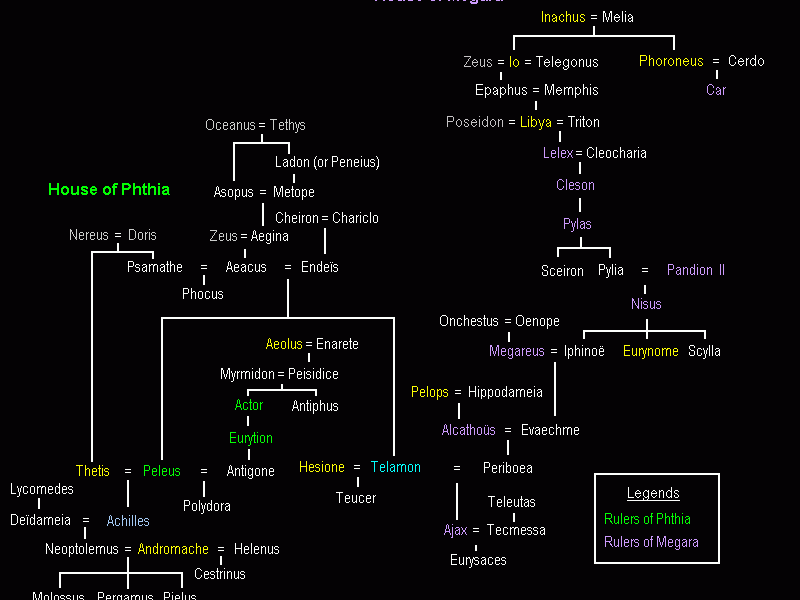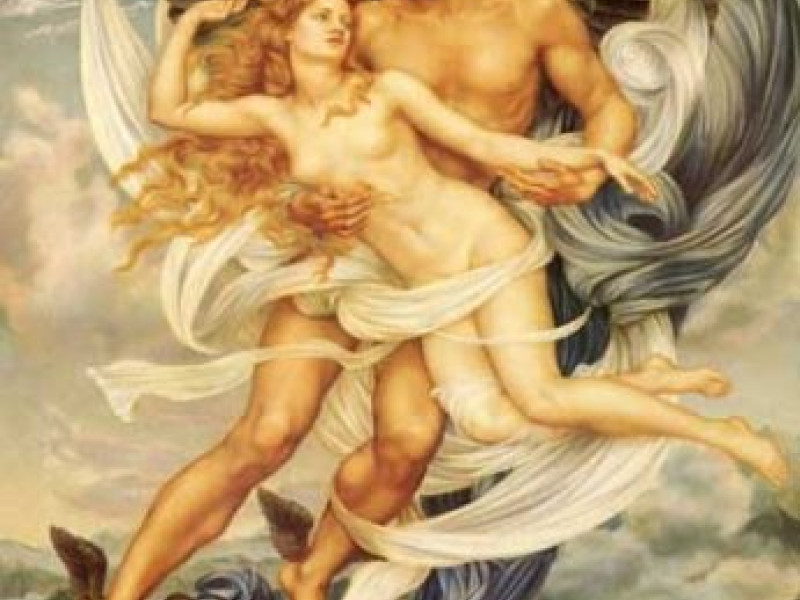Aegeus and Theseus
Some writers said that Aegeus (Αἐγεύς) was the son of Pandion II, the exiled king of Athens, and Pylia, daughter of Pylas, but the usual tales said that Aegeus was only Pandion's adopted son. This version said that Aegeus was actually the son of Scyrius. Aegeus' brothers were Nisus, Pallas and Lycus.
At Pandion's death, as the eldest son, Nisus inherited the throne in Megara. Aegeus and his brothers decided to drive the sons of Metion out of Athens, and shared the kingdom among them. Although they drove out the sons of Metion, Aegeus secured the throne for himself.
Pallas and his fifty sons, known as the Pallantids, tried to stir the Athenians into rebellion against Aegeus' rule, and to depose his brother. So, Aegeus was desperate to sire an heir.
Aegeus married Meta, daughter of Hoples, and then later married Chalciope, daughter of Rhexenor. Neither wife could bear him a son, making him fearful of being without an heir. So Aegeus tried to find a solution to his problem of having a son from the oracle in Delphi. However, the oracle had the king totally baffled, for the god said:
The bulging mouth of the wineskin, most excellent of men,
Untie it not until you have arrived at the height of Athens.
Library, Apollodorus
Aegeus went to Troezen to seek Pittheus' advice. Pittheus was the son of Pelops and the brother of Atreus and Thyestes. Pittheus was considered to be one of the wisest rulers of his time. Pittheus immediately understood the oracle. Pittheus made Aegeus drunk with wine, before sending his daughter Aethra to Aegeus' bed. Aegeus was too intoxicated by the wine, but Poseidon, the great sea god, slept with Aethra and she became pregnant.
Aegeus, thinking that he had made Aethra pregnant, instructed her to send his son to Athens, only if his son could retrieve the sword and sandals he had placed underneath a large boulder. His son (Poseidon's son) was the great hero, Theseus.
Then Aegeus returned to Athens. Some years later, Androgeus, the son of Minos and Pasiphae, came to Athens as a guest of Aegeus in the Panathenaic festival. Androgeus competed and won all of the games.
Aegeus foolishly sent Androgeus to confront the Marathonian Bull (originally called Cretan Bull) and the young Cretan was killed.
Hearing the news, Minos sent his army to Athens and defeated Aegeus in a war. Minos demanded that Aegeus send seven youths and seven maidens every nine years to Crete, as tribute. (A full treatment about the origins of the Cretan/Marathonian Bull, along with Athens' war and tribute to Minos, can be found in Minoan Crete. Theseus slaying the monster Minotaur can be found in the page of Theseus.)
Aegeus later married Medea, the Colchisian sorceress, who promised the king that she would be able to bear him a son. Aegeus became the father of Medus.
A few years later, a hero travelled to Athens, defeating all of the bandits that infested the Isthmian road to Athens. Aegeus did not recognise the young hero, but Medea knew his identity. Fearing that the hero would replace her son as heir to Athens' throne, Medea persuaded Aegeus to poison his guest. Aegeus recognised his sword that the stranger wore, and immediately knocked the drink out of his guest's hand. Medea fled with her son to the East.
Aegeus found out that his guest was his son Theseus, whom he left with Troezen before the hero was born. Aegeus publicly recognised Theseus as his son and heir. Theseus helped his father against the rebellion of Aegeus' brothers – Lycus and Pallas, and Pallas fifty sons. Aegeus drove Lycus into exile, who fled east across the Aegean, to a region in southwest Asia Minor; the region was named after him, Lycia. Theseus killed Pallas and his sons.
Not long after this, Aegeus was due to send his periodic tribute to Minos. Learning of the reason for the tribute, Theseus decided to volunteer as one of the youths to feed the Minotaur. Theseus told his father of his intention to slay the Minotaur and end the tribute to Minos. Aegeus agreed to his son's plan and told Theseus that if he were to succeed, he should return with a white sail hoisted. If the ship were to return with a black sail, then Aegeus would know that the Minotaur had killed Theseus.
Theseus succeeded in killing the Minotaur, and was returning home triumphantly. However, in the excitement of his victory over the bull-headed monster, Theseus forgot to change the sails from black to white. Aegeus, seeing the black sail, thought his son had died in Crete. Grief-stricken over losing his son, Aegeus threw himself off of a cliff. The sea was named after him as the Aegean Sea. See Theseus and the Minotaur.
Theseus succeeded his father as king of Athens. Though he proved to be a wise king, sometimes his love for adventures and rash boldness clouded his judgement and wisdom, as his Cretan adventure had shown (eg. the death of his father). His bravery and his sense of adventure sometimes proved to be a disaster, particularly when it concerned his family and his choice of wives/mistresses.
He abducted and married the Amazon princess, Antiope. Antiope gave him a son named Hippolytus. Either the Amazons came to rescue Antiope or they wished to punish Antiope for marrying Theseus. Whichever version was true, though Theseus defeated the Amazons, Antiope was killed. Some said that Antiope was killed by her sister; others said that Theseus killed her.
When he married Minos' daughter, Phaedra, the sister of Ariadne, Phaedra fatally fell in love with her stepson, Hippolytus. When her love was rejected by Hippolytus, Phaedra committed suicide; she left a false letter that said that her stepson had raped her. Theseus, believing his wife's letter and his son's guilt, banished Hippolytus and foolishly laid a curse upon his son. Poseidon, who fulfilled Theseus' curse/wish, mortally wounded Hippolytus. Theseus only found out later that his son was innocent, when the goddess Athena appeared. See Hippolytus in Theseus.
Theseus was seriously lacking in wisdom when he befriended Peirithoüs (Peirithous), the king of the Lapiths. Theseus abducted Helen of Sparta, the young sister of Castor and Polydeuces (Pollux), who were better known as the Dioscuri. Helen was only a girl of nine, at the time of the abduction. She may have become the mother of Iphigeneia.
The Dioscuri were twin Spartan heroes who were more than a match for Theseus. They brought an army to Athens, rescuing their sister. Since Theseus was absent, Athens surrendered without a fight, and the Dioscuri set Menestheus as its new king. See Helen and Persephone.
Theseus went into exile and died in the court of Lycomedes, on the island of Scyrus. Lycomedes probably murdered the aged hero.
Related Information
Name
Aegeus, Aigeus, Αἐγεύς.
Theseus, Θησεύς.
Sources
The Iliad was written by Homer.
Parallel Lives: Theseus was written by Plutarch.
The Library and the Epitome were written by Apollodorus.
Metamorphoses was written by Ovid.
Fabulae was written by Hyginus.
Library of History was written by Diodorus Siculus.
Related Articles
Theseus, Medea, Minos, Ariadne, Antiope, Hippolytus, Phaedra, Poseidon.
Minotaur, Cretan Bull.
Genealogy: House of Athens.
By Jimmy Joe



